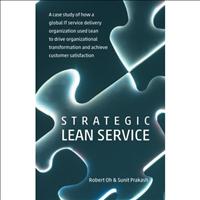 While every company strives to enhance productivity, customer satisfaction and profitability, the way to achieve the objectives differs between organisations, regions and countries.
While every company strives to enhance productivity, customer satisfaction and profitability, the way to achieve the objectives differs between organisations, regions and countries.
In the absence of a template that could be applied to all organisations in all situations, the need to at least find a common ground that would be useful in most cases cannot be over-emphasised.
However, ‘Lean Strategy,’ propounded by Wellington based Sunit Prakash and Singapore based Robert Oh appears to have made a breakthrough with considerable success in the Asia and elsewhere.
The concept is however not new. The Japanese manufacturing industry first applied the ‘Lean Principle’ in 1980s to eliminate waste and increase productivity. It was later adopted by the IT and other industries worldwide and in New Zealand.
India-born Prakash has extensive experience in corporate management and recently returned to the capital after a ten-year tour of duty in Sydney, Australia.
His career in customer satisfaction and technical product support took him on assignments to Brazil and Sweden and team work to US, Holland, Hong Kong, China, Taiwan, Korea, Japan, Singapore and Malaysia.
In New Zealand he has worked in management and consulting roles with global and specialist ICT organisations and other sectors including banking, finance, power utilities, telecommunications, health, local government and gaming.
Competitive spirit
Mr Prakash said as competition increases companies are continually searching for ways to become better and more competitive.
In their quest to find better ways of doing things, many companies and organisations have adopted ‘Lean’ to provide more value, deliver their goods or services more quickly, and turn in higher profits by reducing their costs, he said.
 The Book, called, ‘Strategic Lean Service’ narrates the ‘Y2K’ saga and the nervousness with which global and national companies awaited the start of the new millennium and the impact it would have computer systems and electronic devices.
The Book, called, ‘Strategic Lean Service’ narrates the ‘Y2K’ saga and the nervousness with which global and national companies awaited the start of the new millennium and the impact it would have computer systems and electronic devices.
It outlines how global IT service delivery organisation Baan Customer Service and Support used ‘Lean’ to attain very high levels of customer satisfaction.
Its narrative style, easy-to-read-and understand contents and ‘live examples’ make ‘Strategic Lean Service’ a book of high value that can be read anywhere, anytime and applied to specific corporate circumstances.
As a critic remarked, “It is the story of a life-changing, organisation-transforming expedition, and incorporates the stories, views and vignettes of many members of the Baan Customer Service and Support team. It is highly relevant to any company or organisation that has embarked on, or is about to embark on, initiatives aimed at improving customer value.”
Mr Prakash said there were other books on Lean principles, ‘Strategic Lean Service’ is the first by a New Zealand-based author on ‘Lean applied to services’ and published on Amazon.
“The Lean approach is being increasingly adopted by businesses and organisations throughout New Zealand. Because of my background, I have been able to draw on not only my own experiences, but also colleagues from many parts of the world. This will be of benefit to anyone in New Zealand looking at improving the customer experience, be it through the Lean approach or otherwise,” he said.
‘Strategic Lean Service’ was written in Singapore & Wellington, edited in the Kapiti Coast, coordinated out of India when Mr Prakash was travelling, and has contributions from Australia, Hong Kong, Japan, Spain, Holland and the US.
“Technology made it really easy for us to collaborate globally and to produce, market and distribute the book,” Mr Prakash said.
“Using Skype, Amazon and TruePress as well as LinkedIn, Facebook and Twitter, it is possible to work with colleagues from around the world, distribute it globally, and still have small local print runs for the domestic market.”
Mr Prakash can be contacted by email sunit@sunit.co.nz or on Twitter:@sunitprakash






